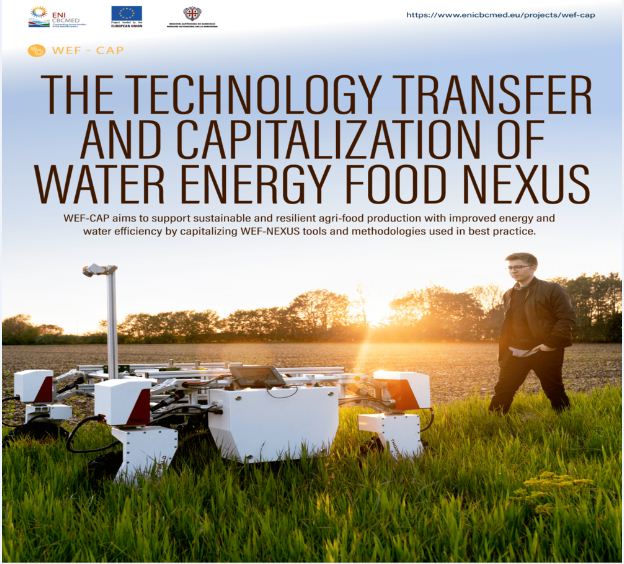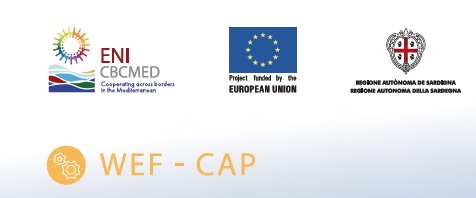 LE FEMISE A LE PLAISIR D’ANNONCER SA PARTICIPATION dans un partenariat régional couvrant Jordanie, Tunisie, Grèce, Italie, Espagne, Egypte & France dans le cadre du projet WEF-CAP: « Transfert de Technologie et Capitalisation du Nexus Eau Energie Alimentation »qui fait partie du Programme IEV CTF MED soutenu par l’Union Européenne.
LE FEMISE A LE PLAISIR D’ANNONCER SA PARTICIPATION dans un partenariat régional couvrant Jordanie, Tunisie, Grèce, Italie, Espagne, Egypte & France dans le cadre du projet WEF-CAP: « Transfert de Technologie et Capitalisation du Nexus Eau Energie Alimentation »qui fait partie du Programme IEV CTF MED soutenu par l’Union Européenne.

Lancé par la Royal Scientific Society, membre de l’association FEMISE, ce projet aborde la durabilité dans la région UE-MED, la sécurité alimentaire, l’environnement, les questions d’inclusivité et d’égalité des chances, et l’intégration du Sud de la Méditerranée dans la chaîne de valeur régionale.
ABOUT THE PROJECT
Background
By 2050, food imbalance in EU-MPC is forecast to reach 60%. Sustainable water resources management is closely related to food security as 70% of global freshwater withdrawals are driven by agriculture. Energy plays a key role in producing/distributing food as well as in extracting/treating/supplying water. Climate projections to 2050 reflect an average temperature increase of 2°C, leading to a 5–10% fall in precipitation and more frequent extreme climatic events, potentially halving agricultural production by 2100. Beyond political uncertainty, generalized economic slowdown, and macroeconomic instability, EUMPC region also needs societal adaptation to climate change through new cross-sectoral approaches to manage energy/water resources and efficiently produce more food for an increasing population. The region presents unbalanced growth, job deficits, youth unemployment, and acquired skills mismatches. Furthermore, the recent COVID19 pandemic exposed the fragility of supply chains, the importance of localized production, and the importance of investment in and capitalization of key enabling technologies, and the need to foster vulnerable groups.
Based on this reality, the need to foster and capitalize WEF NEXUS innovations is increasingly pivotal for social and economic growth and resilience, and towards better policies for inclusive and sustainable economic and social development. With innovation long adopted as a driver for economic growth, numerous innovations/technologies in water, energy, and agri-food have been developed/demonstrated, backed by the EU (across most programs and priorities) as well as by others, albeit with a persistent gap between what is demonstrated and what is capitalized. To address this gap, tools enabling tech-transfer and commercialization were developed and piloted (e.g., NETKITE methodologies).
General Objective
WEF-CAP has identified an opportunity to efficiently capitalize WEF NEXUS practices (and commercialization tools and methodologies), by consolidating a regional metacluster that fosters cooperation and tech-transfer while mainstreaming policy impact for innovation-driven growth, thus effectively supporting education, research, technological development, and innovation. Past successes in the form of technologies, products, practices, policies, and methodologies will be captured, analyzed, catalogued, disseminated, and mobilized towards greater resource efficiency, economic growth, and new policy development, thus multiplying impact towards fair, equitable, sustainable economic, social, and territorial development. This novel multilevel approach combining innovations, clusters, and policy addresses priority A.2.1 in a holistic manner, while synergizing with many other priorities.
Specific objective(s)
- Stocktaking of WEF NEXUS efficient practices and expanding their replication by smooth transfer and exploitation based on viability, feasibility and desirability, overcoming dimensional/financial limitations, increasing territorial resilience, and achieving social and environmental sustainability
- Enabling further commercialization and tech-transfer as a result of a dynamic ecosystem represented by the WEF NEXUS meta cluster, while supporting a thematic observatory to reinforce and replicate more impactful NEXUS innovations that are better equipped for partnership and better aligned with SDGs
- Mainstreaming continuous dialogue and feedback consultations through a schedule of flagship events that generate socially relevant territorial evidences, feeding into decision making for real policies derived from the capitalization of innovation, stocktaking and clustering outcomes and outputs
Who will benefit?
- 14 public institutions related to the WEF-NEXUS ecosystem
- 20 research centers or universities
- 50 SMEs
- 20 technology transfer organizations
- 35 communication media multipliers
Expected achievements
WEF-CAP main outputs include a WEF NEXUS meta cluster, a thematic observatory, a WEF NEXUS innovation commercialization Bootcamp and 12 vouchers, 3 policy briefs, 3 white papers, a practical guide, a synthesis report, a policy recommendations report, 12 capitalization days; 3 multi stakeholders accelerator workshops, 3 clustering TEDs, 3 capitalization nights, 3 networks cafés, a multinational capitalization conferences, contributing to proposed project indicators.
Contribution to policy-making
- Regional policy development of the Mediterranean Strategy for Sustainable Development 2016-2025 and 2030 Agenda for Sustainable Development, through capitalization of identified best innovative integrated WEF technologies to face Sustainable Development Goals (e.g. SDGs 6, 2 and 7 around water, food and energy security, respectively).
- Target actions A1-2, 4-6 of Dialogue 5+5 to stimulate growth, employment and entrepreneurship or the Mediterranean Initiative for Jobs (Med4Jobs) flagship of Union for the Mediterranean by supporting employability of youth and women.
- Initiatives such as Water Integrity Capacity Building Programme for MENA Region will be supported as a result WEF – CAP stocktaking of what has been achieved so far in terms of commercialization and tech-transfer within the WEF NEXUS to change water situation in EU-MPC.
- WEF-CAP outputs complementary contribute to PRIMA initiative and JPI FACCE or WATER by involving a critical mass of actors, resources and strengthening R&I capacities to face future NEXUS challenges to guarantee sustainable farming systems and water management.
Budget
1.1 Million Total Budget
1 Million EU contribution
Project Duration
24 months (From 1st of September 2021 to 31st of August 2023)
Partnership
7 Partners
10 Technical outputs
You can also download the factsheet about the project, by clikcing here


